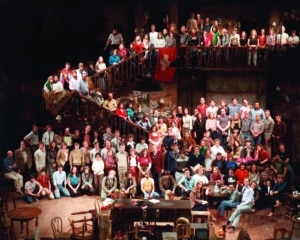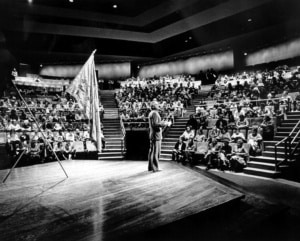DCPA NEWS CENTER
Enjoy the best stories and perspectives from the theatre world today.
Enjoy the best stories and perspectives from the theatre world today.
Word of his death came as like a thunderbolt out of the blue: despite the passage of decades since he left the Denver Center, he remains a towering figure in the Denver Renaissance, transforming the Queen City’s image from Cowtown to Cosmopolis, a sturdy bridge between Henry Irving, Oscar Wilde, the Silver Circuit and millennial Denver’s unquestioned status as creative crucible.
We met at Arena Stage in DC, where I stage managed his glorious production of The Front Page for Zelda Fichandler’s sensational rotating rep (with Salesman and Virginia Woolf), starring the likes of Bob Prosky, Eric Weitz, Dianne Weist, Max Wright, Halo Wines, and Gary Bauer. The scion of Dr. Guthrie’s Minneapolis revolution, Ed instantly won my lifelong admiration.

Denver Center Theatre Company, Early Years
We went our separate ways, until a call came from Denver, in those unmistakable guttural tones, inviting me to come out west to audition for the post of Managing Director of the Denver Center Theatre Company, vacant for the fourth time in three years. But first, he insisted that I write out my thoughts on the perennially fragile balance between artistic direction and operational management: a bond was formed.
Ed’s third and fourth seasons (1981-83) produced works which will remain hallmarks, not just of the Denver Center but of the entire regional theatre movement – America’s “national theatre”. A passionate champion of “resident companies”, he loved the work and he loved the workers, and he customized his seasons to feature the talents of his team. He once noted with pride that, at the first reading of an upcoming play, no introductions were required, as all concerned had worked together before.
Many will agree with me that such productions as the “Tempest”, “Enemy of the People”, “Much Ado About Nothing” (with Mercedes Ruehl and Larry Pine), and “The Taming of the Shrew” set theatrical standards rarely equaled on any stage (least of all his cherished – Shakespearean – unit set).
So much for the classics, hardly surprising from a Guthrie prodigy, but he was also very much the man of his community and his time, which made him the perfect champion of the Denver Center’s greatest hit, the proto-feminist “Quilters” which went on to the Edinburgh and Dublin Festivals, to Broadway, and to record-breaking runs in regional theatres (including Gordon Davidson’s Mark Taper Forum).
While sadly his greatest joy – the recruitment and retention of a core theatre company – was destined for dissolution, the Ed Call diaspora of lieutenants has carried the founder’s vision far afield, as Mark Cuddy, Peter Hackett, Walter Shoen, and Peter Davis – among a host of acolytes – have boldly served Thalia and Melpomene from sea to shining sea.

Edward Payson Call
To conclude with a triad of abiding images of this complicated genius hovering over the sunset, the first a cartoon posted on his office wall in the Bonfils Complex “You’ve got to learn to bend with the bullets” – the dean of guest artists, the mantle of artistic direction rarely sat easily on his shoulders.
The second: his joyful, welcoming, tuxedo-ed presence in the lobby every opening night, the charming happy warrior who never forgot that is takes an audience to transform a play into a performance. No artistic director was ever more adored by his volunteers, for whom he always found time and gratitude.
The third, perhaps learned from the infamously irritable Guthrie: the careful, considerate, professionalism with which he delivered even the most damning notes – whether to directors, designers, actors, stagehands, janitors, or ushers.
While no one would label him “humble”, one of Ed’s most endearing, and enduring, traits was the humility with which he treated this “fabulous invalid” we call the theatre, the generosity which marks those who lead not for self-promotion but for the common wealth – noblesse oblige!
Very few are endowed with such nobility: and those of us who had the luck to work for him are the better for it, whether we know it or not.
Gully Stanford
Managing Director
1981-1984
